英国文学资产阶级革命时期
- 格式:doc
- 大小:46.50 KB
- 文档页数:5
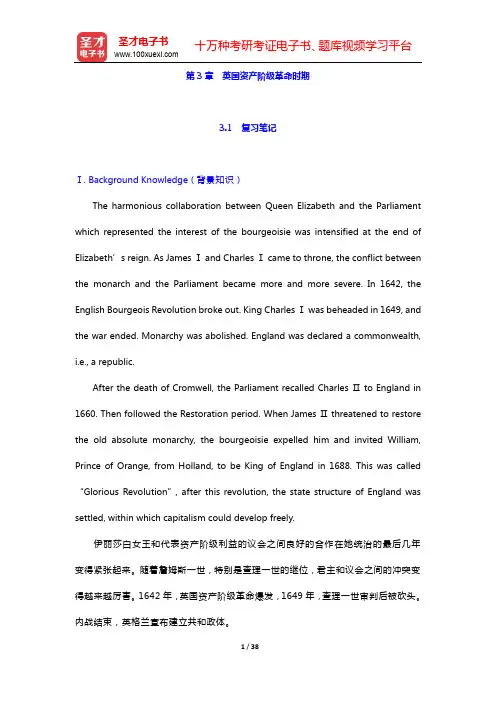
第3章英国资产阶级革命时期3.1 复习笔记Ⅰ. Background Knowledge(背景知识)The harmonious collaboration between Queen Elizabeth and the Parliament which represented the interest of the bourgeoisie was intensified at the end of Elizabeth’s reign. As JamesⅠ and Charles Ⅰ came to throne, the conflict between the monarch and the Parliament became more and more severe. In 1642, the English Bourgeois Revolution broke out. King Charles Ⅰ was beheaded in 1649, and the war ended. Monarchy was abolished. England was declared a commonwealth, i.e., a republic.After the death of Cromwell, the Parliament recalled Charles Ⅱ to England in 1660. Then followed the Restoration period. When James Ⅱ threatened to restore the old absolute monarchy, the bourgeoisie expelled him and invited William, Prince of Orange, from Holland, to be King of England in 1688. This was called “Glorious Revolution”, after this revolution, the state structure of England was settled, within which capitalism could develop freely.伊丽莎白女王和代表资产阶级利益的议会之间良好的合作在她统治的最后几年变得紧张起来。
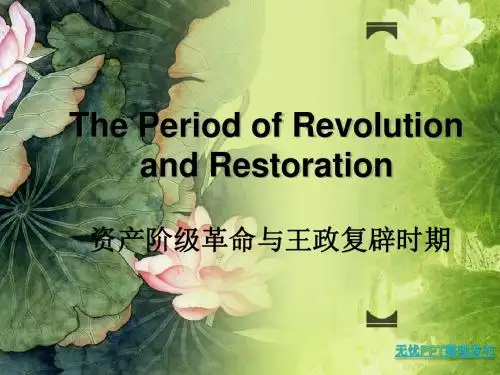
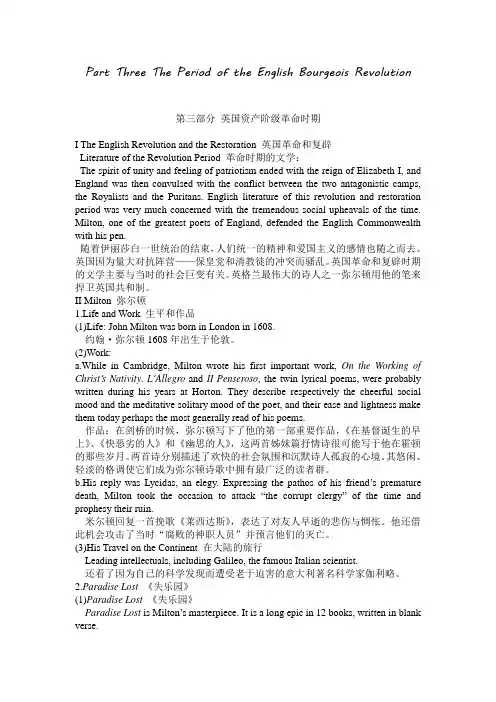
Part Three The Period of the English Bourgeois Revolution第三部分英国资产阶级革命时期I The English Revolution and the Restoration 英国革命和复辟Literature of the Revolution Period 革命时期的文学:The spirit of unity and feeling of patriotism ended with the reign of Elizabeth I, and England was then convulsed with the conflict between the two antagonistic camps, the Royalists and the Puritans. English literature of this revolution and restoration period was very much concerned with the tremendous social upheavals of the time. Milton, one of the greatest poets of England, defended the English Commonwealth with his pen.随着伊丽莎白一世统治的结束,人们统一的精神和爱国主义的感情也随之而去。
英国因为量大对抗阵营——保皇党和清教徒的冲突而骚乱。
英国革命和复辟时期的文学主要与当时的社会巨变有关。
英格兰最伟大的诗人之一弥尔顿用他的笔来捍卫英国共和制。
II Milton 弥尔顿1.Life and Work 生平和作品(1)Life: John Milton was born in London in 1608.约翰·弥尔顿1608年出生于伦敦。

英国资产阶级革命(也被称为英国内战或英国大革命)发生在17世纪中期,具有深远的政治、社会和文化影响。
这一时期的文学作品反映了社会变革和政治动荡的影响。
以下是一些代表性的英国资产阶级革命文学:1. 《牧羊诗》("Pastoral Poetry"):- 作者:约翰·密尔顿(John Milton)- 特点:密尔顿是英国资产阶级革命时期最重要的文学人物之一。
他的《牧羊诗》是他早期的作品之一,描绘了乡村生活和自由的理想,其中尤以《失乐园》("Paradise Lost")最为著名,反映了对权威的质疑和对个体自由的追求。
2. 《记忆的书》("The Book of Memory"):- 作者:霍布斯(Thomas Hobbes)- 特点:霍布斯的政治哲学著作《利维坦》在资产阶级革命时期产生了深远的影响。
他认为社会需要强大的中央政府来维持秩序,对权威的理论贡献影响深远。
3. 《伊利亚特》("Eliot"):- 作者:约翰·多恩(John Donne)- 特点:多恩是一位元代的诗人,他的作品既受到宗教启发,又包含对爱情和个体经验的深刻思考。
他的诗歌作品通过独特的语言表达了对人性和信仰的不同层面的探讨。
4. 《彷徨者的回归》("The Return of the Wanderer"):- 作者:亨利·沃恩(Henry Vaughan)- 特点:亨利·沃恩是一位清教徒诗人,他的诗歌作品表达了对信仰、自然和人类存在的思考。
他的诗歌在英国资产阶级革命时期反映了宗教和哲学的变革。
这些文学作品反映了17世纪中期英国社会和文化的复杂性,以及个体对权威和自由的探求。
它们在历史的长河中成为了英国文学史上重要的一部分。
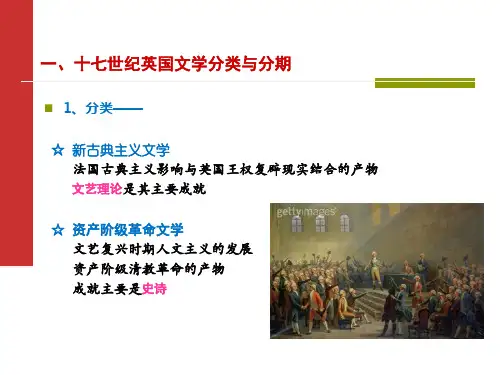
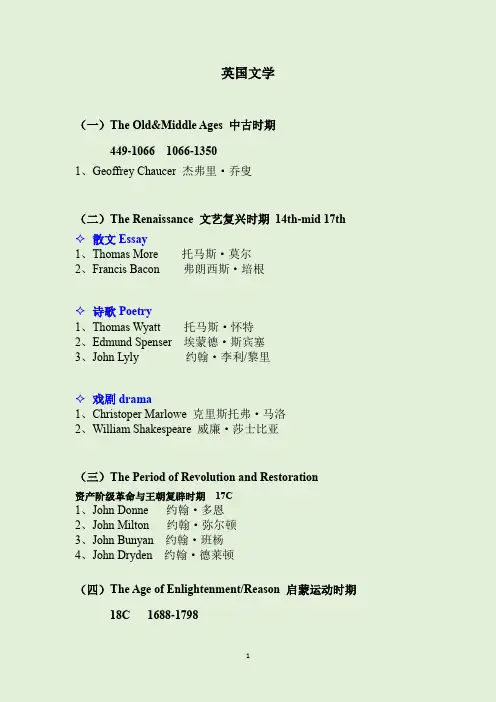
英国文学(一)The Old&Middle Ages 中古时期449-1066 1066-13501、Geoffrey Chaucer 杰弗里·乔叟(二)The Renaissance 文艺复兴时期14th-mid 17th✧散文Essay1、Thomas More 托马斯·莫尔2、Francis Bacon 弗朗西斯·培根✧诗歌Poetry1、Thomas Wyatt 托马斯·怀特2、Edmund Spenser 埃蒙德·斯宾塞3、John Lyly 约翰·李利/黎里✧戏剧drama1、Christoper Marlowe 克里斯托弗·马洛2、William Shakespeare 威廉·莎士比亚(三)The Period of Revolution and Restoration资产阶级革命与王朝复辟时期17C1、John Donne 约翰·多恩2、John Milton 约翰·弥尔顿3、John Bunyan 约翰·班杨4、John Dryden 约翰·德莱顿(四)The Age of Enlightenment/Reason 启蒙运动时期18C 1688-17981、Daniel Defoe 丹尼尔·笛福2、Jonathan Swift 乔纳森·斯威夫特3、Henry Fielding 亨利·菲尔丁4、Richard Brinsley Sheridan 理查德·谢里丹5、Joseph Addison 约瑟夫·爱迪生6、Richard Steele 理查德·斯蒂尔(五)The Romantic Period 浪漫主义时期1798-1832✧诗歌Poetry1、William Blake 威廉·布莱克2、Robert Burns 罗伯特·彭斯3、William Wordsworth 威廉·华兹华斯✧小说Novel1、Jane Austin 简·奥斯汀2、Walter Scott 沃尔特·司各特(六)The Victorian Age 维多利亚时期1832-19021、Charles Dickens 查尔斯·狄更斯2、William Makepeace Thackeray 威廉·梅克比斯·萨克雷3、George Eliot 乔治·艾略特4、The Bronte Sisters 勃朗特三姐妹5、Alfred Tennyson 阿尔弗雷德·丁尼生6、Robert Browning 罗伯特·勃朗宁7、Elizabeth Barrett Browning 伊丽莎白·巴雷特·勃朗宁8、Mathew Arnold 马修·阿诺德(七)The 20th Century 二十世纪1、Thomas Hardy 托马斯·哈代2、John Galsworthy 约翰・高尔斯华绥3、Oscar Wilde 奥斯卡·王尔德4、wrence 大卫·赫伯特·劳伦斯5、Virginia Wolf 弗吉尼亚·伍尔夫6、Joseph Conrad 约瑟夫·康拉德7、James Joyce 詹姆斯·乔伊斯8、George Bernard Shaw 乔治·萧伯纳9、E.M.Forster 爱德华·摩根·福斯特10、William Golding 威廉·戈尔丁。
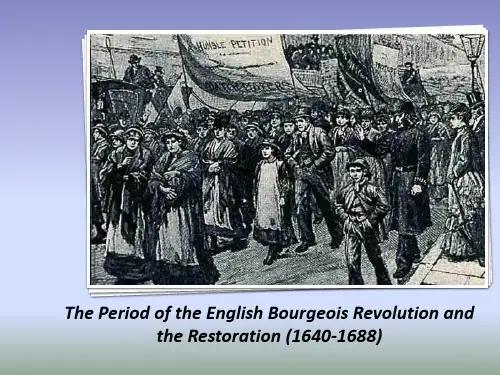
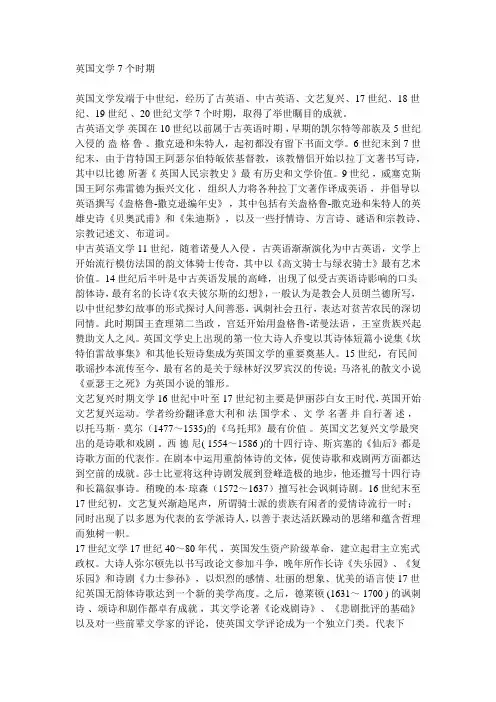
英国文学7个时期英国文学发端于中世纪,经历了古英语、中古英语、文艺复兴、17世纪、18世纪、19世纪、20 世纪文学 7 个时期,取得了举世瞩目的成就。
古英语文学英国在10世纪以前属于古英语时期,早期的凯尔特等部族及 5 世纪入侵的盎格鲁、撒克逊和朱特人,起初都没有留下书面文学。
6世纪末到7世纪末,由于肯特国王阿瑟尔伯特皈依基督教,该教僧侣开始以拉丁文著书写诗,其中以比德所著《英国人民宗教史》最有历史和文学价值。
9世纪,威塞克斯国王阿尔弗雷德为振兴文化,组织人力将各种拉丁文著作译成英语,并倡导以英语撰写《盎格鲁-撒克逊编年史》,其中包括有关盎格鲁-撒克逊和朱特人的英雄史诗《贝奥武甫》和《朱迪斯》,以及一些抒情诗、方言诗、谜语和宗教诗、宗教记述文、布道词。
中古英语文学 11世纪,随着诺曼人入侵,古英语渐渐演化为中古英语,文学上开始流行模仿法国的韵文体骑士传奇,其中以《高文骑士与绿衣骑士》最有艺术价值。
14世纪后半叶是中古英语发展的高峰,出现了似受古英语诗影响的口头韵体诗,最有名的长诗《农夫彼尔斯的幻想》,一般认为是教会人员朗兰德所写,以中世纪梦幻故事的形式探讨人间善恶,讽刺社会丑行,表达对贫苦农民的深切同情。
此时期国王查理第二当政,宫廷开始用盎格鲁-诺曼法语,王室贵族兴起赞助文人之风。
英国文学史上出现的第一位大诗人乔叟以其诗体短篇小说集《坎特伯雷故事集》和其他长短诗集成为英国文学的重要奠基人。
15世纪,有民间歌谣抄本流传至今,最有名的是关于绿林好汉罗宾汉的传说;马洛礼的散文小说《亚瑟王之死》为英国小说的雏形。
文艺复兴时期文学 16世纪中叶至17世纪初主要是伊丽莎白女王时代,英国开始文艺复兴运动。
学者纷纷翻译意大利和法国学术、文学名著并自行著述,以托马斯 ·莫尔(1477~1535)的《乌托邦》最有价值。
英国文艺复兴文学最突出的是诗歌和戏剧。
西德尼( 1554~1586 )的十四行诗、斯宾塞的《仙后》都是诗歌方面的代表作。
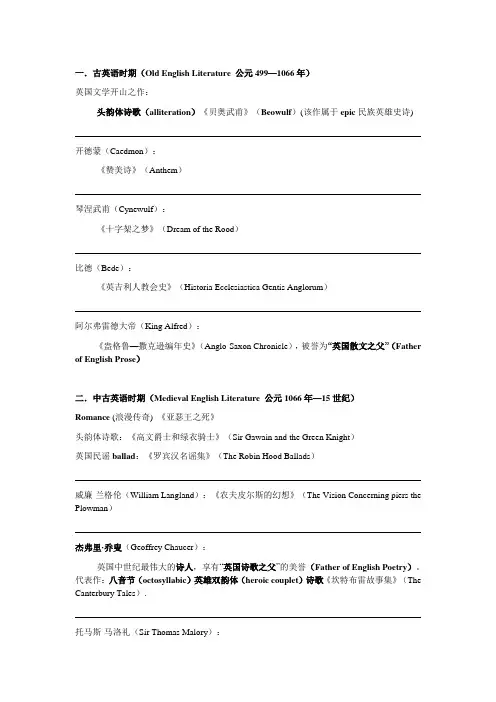
一.古英语时期(Old English Literature 公元499—1066年)英国文学开山之作:头韵体诗歌(alliteration)《贝奥武甫》(Beowulf)(该作属于epic民族英雄史诗)开德蒙(Caedmon):《赞美诗》(Anthem)琴涅武甫(Cynewulf):《十字架之梦》(Dream of the Rood)比德(Bede):《英吉利人教会史》(Historia Ecclesiastica Gentis Anglorum)阿尔弗雷德大帝(King Alfred):《盎格鲁—撒克逊编年史》(Anglo-Saxon Chronicle),被誉为“英国散文之父”(Father of English Prose)二.中古英语时期(Medieval English Literature 公元1066年—15世纪)Romance (浪漫传奇) 《亚瑟王之死》头韵体诗歌:《高文爵士和绿衣骑士》(Sir Gawain and the Green Knight)英国民谣ballad:《罗宾汉名谣集》(The Robin Hood Ballads)威廉·兰格伦(William Langland):《农夫皮尔斯的幻想》(The Vision Concerning piers the Plowman)杰弗里·乔叟(Geoffrey Chaucer):英国中世纪最伟大的诗人,享有“英国诗歌之父”的美誉(Father of English Poetry)。
代表作:八音节(octosyllabic)英雄双韵体(heroic couplet)诗歌《坎特布雷故事集》(The Canterbury Tales).托马斯·马洛礼(Sir Thomas Malory):英国15世纪优秀的散文家,代表作为《亚瑟王之死》(Le Morte d’Arthur)三.文艺复兴时期(Renaissance 15世纪末—17世纪)托马斯·莫尔(Thomas More):伟大的人文主义者,代表作:《乌托邦》(Utopia),《国王爱德华五世悲戚的一生》(The painful Life of Edward Ⅴ).托马斯·魏厄特(Thomas Wyatt)和亨利·霍华德(Henry Howard)的十四行诗(Sonnet).前者将意大利十四行诗引入英国;后者在此基础上,发展了英国十四行诗歌。
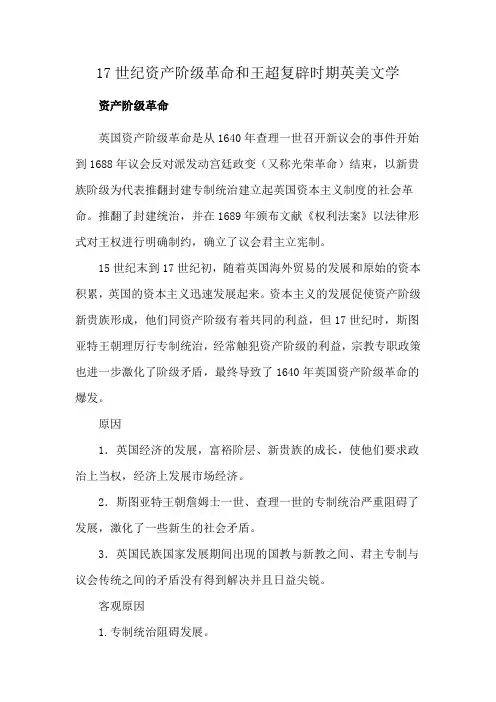
17世纪资产阶级革命和王超复辟时期英美文学资产阶级革命英国资产阶级革命是从1640年查理一世召开新议会的事件开始到1688年议会反对派发动宫廷政变(又称光荣革命)结束,以新贵族阶级为代表推翻封建专制统治建立起英国资本主义制度的社会革命。
推翻了封建统治,并在1689年颁布文献《权利法案》以法律形式对王权进行明确制约,确立了议会君主立宪制。
15世纪末到17世纪初,随着英国海外贸易的发展和原始的资本积累,英国的资本主义迅速发展起来。
资本主义的发展促使资产阶级新贵族形成,他们同资产阶级有着共同的利益,但17世纪时,斯图亚特王朝理厉行专制统治,经常触犯资产阶级的利益,宗教专职政策也进一步激化了阶级矛盾,最终导致了1640年英国资产阶级革命的爆发。
原因1.英国经济的发展,富裕阶层、新贵族的成长,使他们要求政治上当权,经济上发展市场经济。
2.斯图亚特王朝詹姆士一世、查理一世的专制统治严重阻碍了发展,激化了一些新生的社会矛盾。
3.英国民族国家发展期间出现的国教与新教之间、君主专制与议会传统之间的矛盾没有得到解决并且日益尖锐。
客观原因1.专制统治阻碍发展。
2.新贵族和富裕阶层势力的壮大。
特点1 宗教旗帜鲜明。
值得注意的是,在第一次内战期间王党与议会阵营之间最大的差别并不在于双方的阶级构成,而在于双方的宗教信仰。
总的来说,信仰清教者支持议会,信仰国教者则支持国王。
2 传统观点认为,在第一次内战期间,英国资产者与新贵族结成联盟共同反对英国君主专制。
不过,在内战过程中,无论是王党还是议会,双方的支持者中均有资产者、商人、工匠和农民等,支持谁取决于英国地方乡绅的态度,而阶级分化相比宗教分野并不显著,因此对于革命的阶级性这一观点仍有待商榷。
3 革命曲折反复,具有长期性、复杂性、反复性和艰巨性。
4 开辟了革命的新时代。
结果1688年“光荣革命”标志着英国革命的结束。
1689年的《权利法案》使英国确立了君主立宪制。
意义影响英国革命确立了“议会制君主立宪制(议会君主制)”、“内阁制”,颁布《权利法案》。
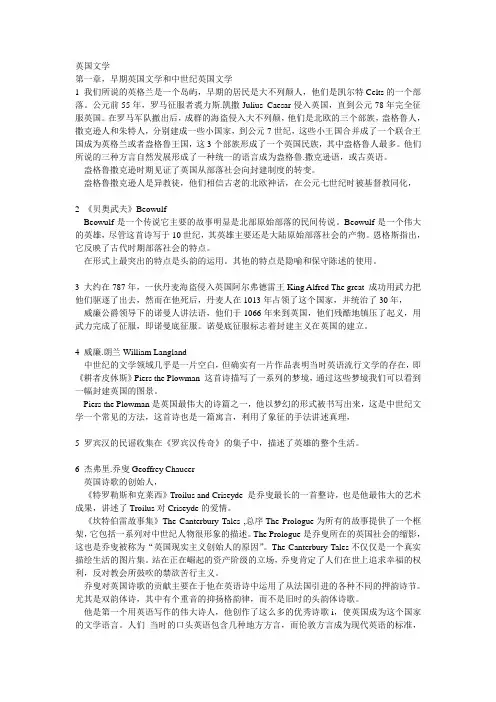
英国文学第一章,早期英国文学和中世纪英国文学1 我们所说的英格兰是一个岛屿,早期的居民是大不列颠人,他们是凯尔特Celts的一个部落。
公元前55年,罗马征服者裘力斯.凯撒Julius Caesar侵入英国,直到公元78年完全征服英国。
在罗马军队撤出后,成群的海盗侵入大不列颠,他们是北欧的三个部族,盎格鲁人,撒克逊人和朱特人,分别建成一些小国家,到公元7世纪,这些小王国合并成了一个联合王国成为英格兰或者盎格鲁王国,这3个部族形成了一个英国民族,其中盎格鲁人最多。
他们所说的三种方言自然发展形成了一种统一的语言成为盎格鲁.撒克逊语,或古英语。
盎格鲁撒克逊时期见证了英国从部落社会向封建制度的转变。
盎格鲁撒克逊人是异教徒,他们相信古老的北欧神话,在公元七世纪时被基督教同化,2 《贝奥武夫》BeowulfBeowulf是一个传说它主要的故事明显是北部原始部落的民间传说。
Beowulf是一个伟大的英雄,尽管这首诗写于10世纪,其英雄主要还是大陆原始部落社会的产物。
恩格斯指出,它反映了古代时期部落社会的特点。
在形式上最突出的特点是头韵的运用。
其他的特点是隐喻和保守陈述的使用。
3 大约在787年,一伙丹麦海盗侵入英国阿尔弗德雷王King Alfred The great 成功用武力把他们驱逐了出去,然而在他死后,丹麦人在1013年占领了这个国家,并统治了30年,威廉公爵领导下的诺曼人讲法语,他们于1066年来到英国,他们残酷地镇压了起义,用武力完成了征服,即诺曼底征服。
诺曼底征服标志着封建主义在英国的建立。
4 威廉.朗兰William Langland中世纪的文学领域几乎是一片空白,但确实有一片作品表明当时英语流行文学的存在,即《耕者皮休斯》Piers the Plowman 这首诗描写了一系列的梦境,通过这些梦境我们可以看到一幅封建英国的图景。
Piers the Plowman是英国最伟大的诗篇之一,他以梦幻的形式被书写出来,这是中世纪文学一个常见的方法,这首诗也是一篇寓言,利用了象征的手法讲述真理,5 罗宾汉的民谣收集在《罗宾汉传奇》的集子中,描述了英雄的整个生活。
英国资产阶级革命文学17世纪的英国文学,由于受到人文主义文学、巴洛克文学和古典主义文学思潮的影响,情况比较复杂。
40年代革命时期,出现了革命诗人弥尔顿,其作品反映了英国资产阶级的革命情绪。
60年代王政复辟时期,出现了来自下层的清教徒作家班扬,在其创作中继续坚持民主倾向。
英国资产阶级革命与这个时期的英国文学有着血肉关系,它对这个时期的资产阶级革命文学有直接的影响,英国资产阶级革命文学就是英国资产阶级革命的产物。
玄学派17世纪初在英国形成的以多恩为代表的一个诗歌流派,因诗人屈莱顿批评多恩“诗中的玄学成份太多了”而得名。
这一流派的诗歌一般写爱情、隐居的生活和宗教感情。
他们脱离现实,强调个人的内心感受,以意象奇幻取胜,因而内容晦涩难懂。
沙龙文学17世纪法国的贵族形式主义文学,因其多在巴黎贵妇人的客厅中形成而得名。
其体裁有爱情小说、田园小说和抒情诗。
沙龙文学美化骑士生活,缅怀中古,内容怪异神秘,艺术矫揉造作,语言晦涩难懂。
代表作家为伏瓦蒂尔。
《失乐园》英国17世纪清教徒作家弥尔顿的代表作,取材于《旧约•创世纪》,叙述了人类始祖亚当和夏娃受魔鬼诱惑触犯戒律,被上帝逐出乐园的故事,诗中成功塑造了反叛上帝,坚毅果敢的恶魔撒旦形象,在其身上寄予了诗人自己的革命激情。
史诗想象丰富,气势恢宏,是英国文学史上第一部文人史诗。
启蒙运动启蒙运动是18世纪产生的具有全欧性质的一场资产阶级政治思想文化运动。
这场运动是文艺复兴运动在新的历史条件下的继续和发展,实质是法国大革命前新兴资产阶级向封建阶级夺权之前的一次舆论大准备。
所谓启蒙就是要启迪蒙昧,开发蒙昧,给予知识和光明。
当时先进的思想家把启蒙教化作为改造社会的基本方法,这样一个思想、社会思潮的形成,就叫做启蒙运动。
启蒙文学18世纪在欧洲出现的启蒙运动是西方资产阶级第二次反封建反教会的思想文化运动,启蒙文学是这一运动的组成部分。
启蒙文学具有鲜明的政治色彩、强烈的战斗性和批判性;它把所谓“第三等级”的普通人作为正面主人公加以歌颂,反映资产阶级和平民的思想感情;启蒙作家常常借用古典主义的文学形式,给它注入了新的思想内容,也创造了不少新的文学形式,如哲理小说、正剧(严肃喜剧)、书信体小说、对话体小说、教育小说等,打破了古典主义的一些清规戒律,拓展了文学表现的领域。
英国资产阶级革命时期文学English Literature in the period of the English Bourgeois Revolution(英国资产阶级革命时期文学)时代背景:1642年英国资产阶级革命爆发,1649年查理一世被砍头。
内战结束,英国建立起共和政体。
英国资产阶级革命时期文学特点及作品:资产阶级革命时期,文艺复兴的狂热耗尽,但文学作品产量没有减少,大体上扩展到更广更深奥晦涩的学问领域,而不是创作领域。
这一时期诗歌占主导地位,著名的诗人有约翰·弥尔顿,他创作史诗《失乐园》《复乐园》和诗歌戏剧《力士参孙》。
当时存在玄学派诗人(Metaphysical poet)和骑士学派诗人(Cavalier poets)。
小说体散文以班杨的《天路历程》为代表。
约翰·德莱顿是当时最重要的诗人和批评家,著有剧本《一切为了爱》和散文《论戏剧诗》作家及其作品:John Milton(约翰·弥尔顿):十七世纪中期英国最伟大的诗人和小册子作者。
出生于伦敦一个富有家庭,在剑桥大学取得学士和硕士学位。
后隐居在父亲的乡间别墅里,钻研各种作品。
他的文学成就可以分为早期的文学诗作,中期的散文性小册子,后期的伟大诗篇。
Paradise Lost《失乐园》(1667):一篇十二卷的长篇史诗,故事的原型是《圣经》里的《创世纪3:1-24》。
主题是“人类的堕落”,也即人类的违抗和乐园的丧失,其根本原因是撒旦。
在天堂,撒旦领导了一场反抗上帝的叛乱,失败后,和造反天使一起被扔进地狱。
这首诗继续讲述撒旦如何通过引诱亚当和夏娃来复仇,后来亚当和夏娃因偷吃智慧树上的果实被赶出乐园。
Paradise regained《复乐园》:继续深入研究诱惑和堕落这个主题:通过撒旦对耶稣基督的诱惑来证明他的神性。
耶稣在四十天的荒野生活中抵制了一个又一个诱惑,而诱惑者撒旦最后遭到了失败。
Samson Agonistes《力士参孙》:一部用无韵诗写的悲剧,主人公参孙遭到妻子的背叛后被菲利士人俘虏,他能从上帝获得力量的头发也被剪断,眼睛被弄瞎。
一.古英语时期(Old English Literature 公元499—1066年)英国文学开山之作:头韵体诗歌(alliteration)《贝奥武甫》(Beowulf)开德蒙(Caedmon):《赞美诗》(Anthem)琴涅武甫(Cynewulf):《十字架之梦》(Dream of the Rood)比德(Bede):《英吉利人教会史》(Historia Ecclesiastica Gentis Anglorum)阿尔弗雷德大帝(King Alfred):《盎格鲁—撒克逊编年史》(Anglo-Saxon Chronicle),被誉为“英国散文之父”(Father of English Prose)二.中古英语时期(Medieval English Literature 公元1066年—15世纪)头韵体诗歌:《高文爵士和绿衣骑士》(Sir Gawain and the Green Knight)英国名谣:《罗宾汉名谣集》(The Robin Hood Ballads)威廉·兰格伦(William Langland):《农夫皮尔斯的幻想》(The Vision Concerning piers the Plowman)杰弗里·乔叟(Geoffrey Chaucer):英国中世纪最伟大的诗人,享有“英国诗歌之父”的美誉(Father of English Poetry)。
代表作:八音节(octosyllabic)英雄双韵体(heroic couplet)诗歌《坎特布雷故事集》(The Canterbury Tales)。
托马斯·马洛礼(Sir Thomas Malory):英国15世纪优秀的散文家,代表作为《亚瑟王之死》(Le Morte d’Arthur)三.文艺复兴时期(Renaissance 15世纪末—17世纪)托马斯·莫尔(Thomas More):伟大的人文主义者,代表作:《乌托邦》(Utopia),《国王爱德华五世悲戚的一生》(The painful Life of Edwar d Ⅴ).托马斯·魏厄特(Thomas Wyatt)和亨利·霍华德(Henry Howard)的十四行诗(Sonnet)。
英国文学知识一.古英语时期(Old English Literature 公元499—1066年)英国文学开山之作:头韵体诗歌(alliteration)《贝奥武甫》(Beowulf)开德蒙(Caedmon):《赞美诗》(Anthem)琴涅武甫(Cynewulf):《十字架之梦》(Dream of the Rood)比德(Bede):《英吉利人教会史》(Historia Ecclesiastica Gentis Anglorum)阿尔弗雷德大帝(King Alfred):《盎格鲁—撒克逊编年史》(Anglo-Saxon Chronicle),被誉为“英国散文之父”(Father of English Prose)二.中古英语时期(Medieval English Literature 公元1066年—15世纪)头韵体诗歌:《高文爵士和绿衣骑士》(Sir Gawain and the Green Knight)英国名谣:《罗宾汉名谣集》(The Robin Hood Ballads)威廉·兰格伦(William Langland):《农夫皮尔斯的幻想》(The V ision Concerning piers the Plowman)杰弗里·乔叟(Geoffrey Chaucer):英国中世纪最伟大的诗人,享有“英国诗歌之父”的美誉(Father of English Poetry)。
代表作:八音节(octosyllabic)英雄双韵体(heroic couplet)诗歌《坎特布雷故事集》(The Canterbury Tales)。
托马斯·马洛礼(Sir Thomas Malory):英国15世纪优秀的散文家,代表作为《亚瑟王之死》(Le Morte d’Arthur)三.文艺复兴时期(Renaissance 15世纪末—17世纪)托马斯·莫尔(Thomas More):伟大的人文主义者,代表作:《乌托邦》(Utopia),《国王爱德华五世悲戚的一生》(The painful Life of Edwar d Ⅴ).托马斯·魏厄特(Thomas Wyatt)和亨利·霍华德(Henry Howard)的十四行诗(Sonnet)。
Chapter 1 The English Revolution and Restoration1. Queen Elizabeth I died leaving no heirs, thus ending the Tudor dynasty.2. James I became the new king in 1603.–Began the Stuart line of kings–Great Britain became the United Kingdom3. Believed in the Divine Right of Kings.-- God made him king and God alone can tell him what to do.-- Did not allow Puritans to make changes in the Church of England or to challenge his authority.-- Caused friction with Parliament used to working with the monarch.-- When Parliament complained, Charles disbanded it for 11 years.4. The English Civil War (1642--1649)⏹The King’s supporters-- Called Cavaliers-- Mostly Anglicans, Catholics-- Mostly landed nobility⏹The Parliament’s supporters-- Called the Roundheads-- Mostly Puritans-- Mostly middle class5. The Commonwealth6. The Restoration(1660-16887. The Glorious Revolution (1688)⏹Charles II died in 1685, his brother James was his successor.⏹James II was Roman Catholic, who believed in divine right .⏹James II was expelled by Parliament.⏹William from Holland became the King.⏹Constitutional MonarchyJohn Donne (1572-1631)---the founder of the Metaphysical schoolI. Metaphysical Poetry•Metaphysical Poetry(玄学派诗歌)•It is the poetry of John Donne and other seventeenth-century poets who wrote in a similar style. Metaphysical poetry is characterized by verbal wit and excess, ingenious structure, irregular meter, colloquial language, elaborate imagery, and metaphysical conceits and a drawing together of dissimilar ideas.•Example: compare love bt. Husband and wife with compass.;•dislike traditional poem•Scholar, Highly abstract or theoretical;•Example:“It sucked me first, and now sucks thee,And in this flea, our two bloods mingled be;This flea is you and I, and thisOur marriage bed, and marriage temple is”Cavalier Poets(保皇派诗人)•Cavalier poets were often courtiers.•The Cavalier poets wrote light poetry, polished and elegant, but often superficial. They mostly dealt in short songs on the flitting joys of the day, but underneath their light-heartedness lies some foreboding of impending doom. This spirit of pessimism and cynicism is typical of the aristocratic class in decline.PART THREE: THE PERIOD OF THE ENGLISH BOURGEOIS REVOLUTIONChapter 1. The English Revolution and the RestorationⅠ. The Weakening of the Tie Between Monarchy and Bourgeoisie:During the Tudor dynasty (1485-1603) the English bourgeoisie lived in harmony with the Crown. Until about 1590, the bourgeoisie had many interests in common with those of the monarchy —in the struggles against Spain, against the Roman Catholic Church, against noble houses ruining the country with their civil wars. Hence the collaboration between the monarchy and the bourgeoisie. But when all its internal and external foes had been crushed, the bourgeoisie ceased to depend upon the protection of the monarchy. At the same time the Crown strove to consolidate its position before it was too late. There had already been some conflict between the Queen and Parliament at the end of Elizabeth's reign. There were more and more quarrels of James I and Charles I with their Parliaments.Ⅱ. The Clashes Between the King and Parliament:The major parliamentary clashes of the early 17th century were over monopolies, the means by which the monarchy attempted to control commercial activity in the interests of the court.The king granted monopolies on such and such merchandises to his favourites, and then nobody could sell them without purchasing the permission of the monopoly holders. This caused grave inconvenience to merchants and a sharp rise in prices. And monopolies were extended in the reigns of James I and Charles I on such necessities as butter, herrings, salt, beer, and many others.At last the Parliament declared that monopolies without its consent were illegal. Charles I dissolved it in 1629. For eleven years Charles ruled the country with an absolute government. He relied upon the prerogative courts (the Star Chamber, etc.) as the instruments of his policy.Severe persecutions hit the capitalist class as a whole. Thus arose the demand for a new government on the part of the English bourgeoisie.Ⅲ. The Outburst of the English Revolution:The various classes in England soon split up into two camps. The opposition leaders in Parliament were supported by contributions of merchants, the mass demonstrations of artisans and apprentices in the city, and by the peasants' riots against enclosures in the countryside. While around the King were clustered the conservative gentry, the big landlords and the monopolists. A civil war broke out in 1642 and lasted till 1649.At first, the Royalists had certain military advantages. Then Oliver Cromwell (1599-1658), the famous opposition leader, reorganized the Parliamentary forces into the New Model Army. Once properly organized, the Army advanced rapidly to victory and the Royalists were decisively routed in Naseby in 1645. The war soon ended and Charles was captured. But he escaped from captivity, and civil war broke out again until the King was re-captured and executed in 1649, as "a public enemy to the good people of this nation." Monarchy was abolished. England was declared a commonwealth, i.e., a republic.Ⅳ. The Split within the Revolutionary Camp:As soon as victory was won, there arose a split in the revolutionary camp. First, the middle bourgeoisie (Independents) struggled with the big bourgeoisie (Presbyterians) for the supremacy in Parliament. Then the bourgeoisie as a whole broke with the people. So class struggle became complicated under the new situation.The Levellers, a section of the petty bourgeoisie, maintained that "the poorest he that is in England hath a life to live as the greatest he", and wanted manhood suffrage. But the Independents, who represented the bourgeoisie, answered: "Liberty cannot be provided for in a general sense." The ordinary people who previously fought for the Parliament were now disappointed; they felt they had been betrayed. A revolt of the Levellers broke out and was put down by Cromwell.At the same time arose the movement of the Diggers who preached a rural communism and led the poor peasants to dig up the waste land in several places. But this was also suppressed by the landlords and soldiers. Gerard Winstanley (1609-52?), leader of the Diggers, wrote: "Every one talks of freedom, but there are but few that act for freedom, and the actors of freedom are oppressed by the talkers and verbal professors of freedom." The full realization of the people's democracy is impossible unless there is a working class to carry it out thoroughly.Ⅴ. The Bourgeois Dictatorship and the Restoration:Thus the bourgeois dictatorship was established, and Cromwell became the Protector of the English Commonwealth. But the breach of the big bourgeoisie with the popular forces meant that their government could only be maintained by a compromise with the feudal remnants. After the death of Cromwell, the Parliament recalled Charl es Ⅱ to England in 1660. Then followed the Restoration period. A white terror was introduced to the country. Many Republicans were put to death. Most notorious was Jeffreys, the Chief Justice of Charles Ⅱ and James Ⅱ. He alone executed hundreds of innocent people. But the big bourgeoisie was more afraid of the people's revolution than of the King's reaction. Only when James Ⅱ threatened torestore the old absolute monarchy that the bourgeoisie expelled him and invited William, Prince of Orange, from Holland, to be King of England, in 1688. This was the so-called "Glorious Revolution" —"glorious" because it was bloodless and there was no revival of the revolutionary demands. So, after a century of disputes and battles, the state structure of England was settled, within which capitalism could develop freely.Ⅵ. The Religious Cloak of the English Revolution:The English Revolution was carried out under a religious cloak. Religious disputes filled many pages of the political pamphlets of the 17th century: Both sides believed they were fighting God's battles. But religion covered something more. Marx pointed out, "Cromwell and the English people had borrowed speech, passions and illusions from the Old Testament for their revolution." That is why the English Revolution was sometimes called the Puritan Revolution.Puritanism was the religious doctrine of the revolutionary bourgeoisie during the English Revolution. It preached thrift, sobriety, hard work and unceasing labour in whatever calling one happened to be, but with no extravagant enjoyment of the fruits of labour. The wealthy were to accumulate capital, the poor to labour at their tasks, as a "divine duty." Worldly pleasures were condemned as harmful. This was precisely the outlook needed by the bourgeoisie for the accumulation of capital. The Puritans opposed the old church that squandered a lot of money upon robes, candles and magnificent processions. They closed down the London theatres in 1642, not only for their extravagance and deterioration but also for the puritanic abhorrence of "worldly" pleasures in general.Ⅶ. Literature of the Revolution Period:The spirit of unity and the feeling of patriotism ended with the reign of Elizabeth I, and England was then convulsed with the conflict between the two antagonistic camps, the Royalists and the Puritans. English literature of this revolution and restoration period was very much concerned with the tremendous social upheavals of the time. Milton, one of the greatest poets of England, defended the English Commonwealth with his pen. His pamphlets, together with those of Gerard Winstanley and John Lilburne (1614-57), leader of the Levellers, played an active part in pushing on the revolutionary cause. Even after the Restoration in 1660, Milton and Bunyan, the poor tinker-writer, continued to defend in their works the ideals of the Revolution, "the good old cause", and expose the reactionary forces. We shall first discuss them in the following chapters.。